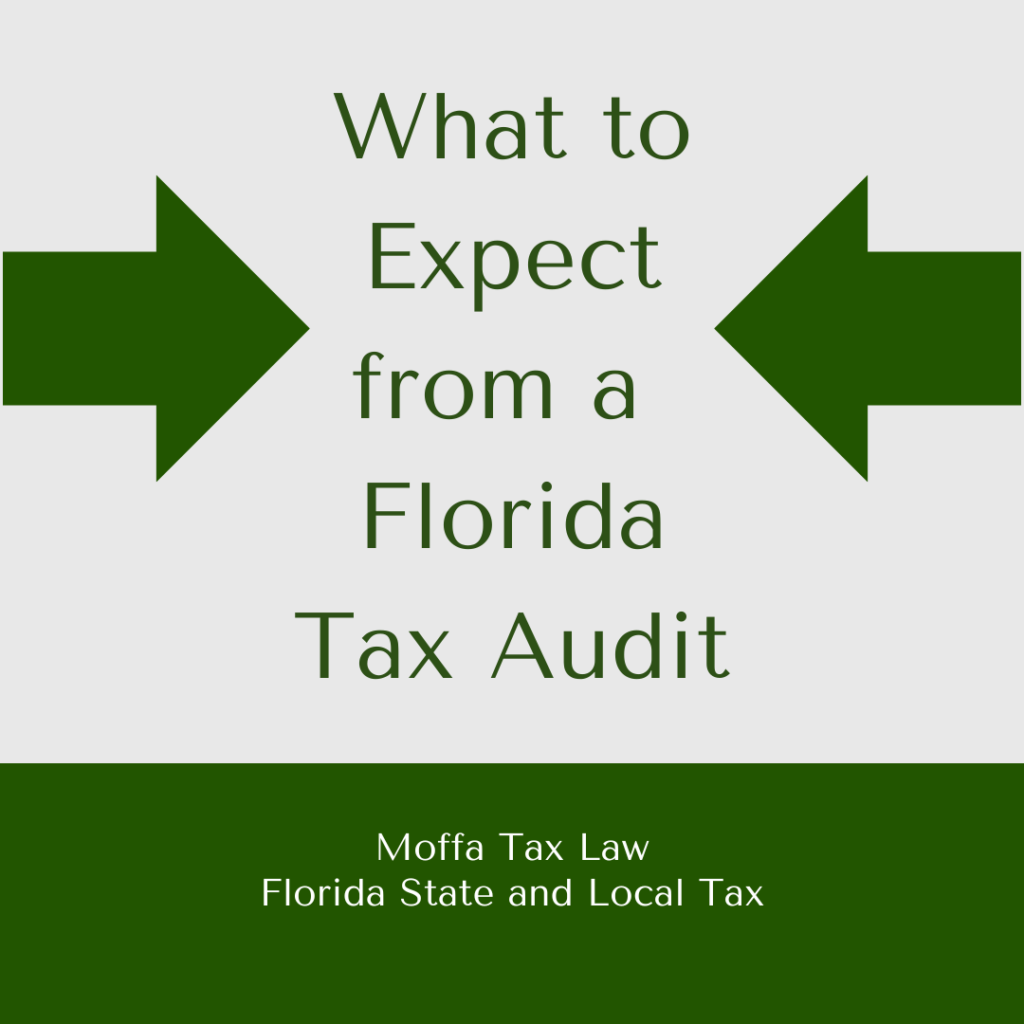NEWS & INSIGHTS


Florida Tax Audit – What to Expect from DOR
If you’re a resident or business owner in Florida, understanding the process of a tax audit and what to expect can ease much of the anxiety and help you prepare effectively. Whether the audit stems from sales tax discrepancies, corporate income tax issues, or use tax concerns, having a clear roadmap is essential to ensure compliance and mitigate potential penalties.
In this comprehensive guide, we’ll break down the key aspects of a Florida tax audit, from its initiation to its conclusion. By the end, you’ll have a clearer understanding of the process and the steps to take if you’re ever audited by the Florida Department of Revenue (FDOR).
1. Why Am I Being Audited?
A tax audit in Florida can occur for several reasons, including but not limited to:
Random Selection: The FDOR sometimes conducts audits randomly as part of its routine compliance checks.
Inconsistencies in Tax Returns: Discrepancies between reported income and filed taxes can raise red flags.
Industry-Specific Risks: Certain industries, such as hospitality, retail, and construction, are more likely to be audited due to their frequent dealings with sales and use taxes.
Third-Party Information: If a vendor, customer, or employer reports information that contradicts your tax filings, it may trigger an audit.
High-Risk Transactions: Significant deductions, exemptions, or claims that deviate from industry norms may also prompt an audit.
Understanding why you’re being audited can help you better prepare and respond appropriately.
2. Types of Tax Audits in Florida
The FDOR conducts various types of audits depending on the tax type and the suspected issue. These include:
Sales and Use Tax Audits: Florida relies heavily on sales tax revenue, and the FDOR frequently audits businesses to ensure proper collection and remittance of these taxes. Auditors will review records to verify that sales tax was correctly charged, collected, and paid.
Corporate Income Tax Audits: Businesses in Florida that generate income from sources within the state must pay corporate income tax. The audit focuses on verifying deductions, income reporting, and other elements of corporate tax compliance.
Consumer Use Tax Audits: This audit ensures businesses and individuals pay use tax on taxable items purchased without sales tax, such as online purchases or goods bought from out-of-state vendors.
Documentary Stamp Tax Audits: For transactions involving real estate or financial obligations, the FDOR might conduct audits to confirm accurate reporting and payment of documentary stamp taxes.
Fuel Tax Audits: Businesses involved in selling or using fuel are subject to audits to verify compliance with Florida’s fuel tax laws.
3. Steps in the Florida Tax Audit Process
The tax audit process typically follows these steps:
Initial Notification: You’ll receive a formal notice from the FDOR informing you of the audit. This notification typically outlines the type of tax under review, the audit period, and the specific records you’ll need to provide.
Key Tip: Respond promptly to avoid delays or penalties.
Pre-Audit Meeting: Before the audit begins, the auditor may schedule a meeting to discuss the process, clarify expectations, and provide a timeline. This is an opportunity for you to ask questions and better understand what is required.
Document Submission: Auditors will request access to financial records, such as tax returns, invoices, receipts, bank statements, and other relevant documents. It’s critical to ensure these records are organized, complete, and accurate.
Field Audit: For businesses, the audit may involve a field visit where the auditor reviews records on-site. They may also conduct interviews with key personnel to gain insight into your operations and tax practices.
Audit Analysis: The auditor will analyze the submitted records for discrepancies, errors, or instances of non-compliance. They’ll compare reported figures with actual data and identify any tax liabilities.
Preliminary Findings: Once the audit is complete, the auditor will present preliminary findings, detailing any discrepancies and potential adjustments to your tax obligations.
Response and Discussion: You’ll have the opportunity to review the findings, provide explanations, or submit additional documentation to dispute any errors in the auditor’s conclusions.
Final Report and Resolution: The FDOR will issue a final audit report. If additional taxes are owed, you’ll receive a notice detailing the amount and the timeline for payment. In cases of overpayment, a refund may be issued.
4. How to Prepare for a Florida Tax Audit
Preparation is the key to minimizing stress and ensuring a smoother audit process:
Maintain Accurate Records: Keep all relevant financial documents for at least five years, as this is typically the audit period reviewed by the FDOR.
Conduct Internal Reviews: Periodically review your tax filings and financial records to identify and correct discrepancies.
Seek Professional Assistance: Hire a tax professional, accountant, or attorney to guide you through the audit and communicate with the auditor on your behalf.
Understand Florida Tax Laws: Familiarize yourself with state-specific tax rules to ensure compliance and avoid inadvertent errors.
5. What to Do If You Disagree with the Audit Findings
If you disagree with the results of a tax audit, you have the right to challenge the findings. Here’s how:
Request a Reconsideration: Provide additional evidence or clarification to the FDOR to address the discrepancies.
File an Appeal: If the reconsideration doesn’t resolve the issue, you can file an appeal with the Florida Division of Administrative Hearings.
Seek Legal Counsel: Engage a tax attorney to represent you in disputes and ensure your rights are protected.
Tips for Avoiding Future Audits
While audits are sometimes unavoidable, certain practices can reduce your risk:
File accurate and timely tax returns.
Avoid underreporting income or overclaiming deductions.
Keep detailed and organized records.
Regularly consult with a tax professional to ensure compliance.
Conclusion
A Florida tax audit can feel overwhelming, but with proper preparation and a proactive approach, you can navigate the process with confidence. Understanding why audits occur, knowing what to expect, and taking the necessary steps to prepare are critical to ensuring a favorable outcome.
Remember, the FDOR’s goal isn’t necessarily to penalize taxpayers but to ensure compliance with state tax laws. By cooperating with auditors and seeking professional guidance when needed, you can emerge from the audit process with minimal disruption to your personal or business finances.
Additional Articles by the SALTy Orange at Moffa Tax Law:
Temporary Suspension of Hillsborough County Discretionary Sales Surtaxes
Motor Vehicle Sales Tax Rates by State – 2024
Florida Corporate Income Tax Case Lost on Procedural Technicality

Jeanette Moffa, Esq.
Phone: (954) 800-4138
Email: JeanetteMoffa@MoffaTaxLaw.com
Jeanette Moffa is a Partner in the Fort Lauderdale office of Moffa, Sutton, & Donnini. She focuses her practice in Florida state and local tax. Jeanette provides SALT planning and consulting as part of her practice, addressing issues such as nexus and taxability, including exemptions, inclusions, and exclusions of transactions from the tax base. In addition, she handles tax controversy, working with state and local agencies in resolution of assessment and refund cases. She also litigates state and local tax and administrative law issues.


